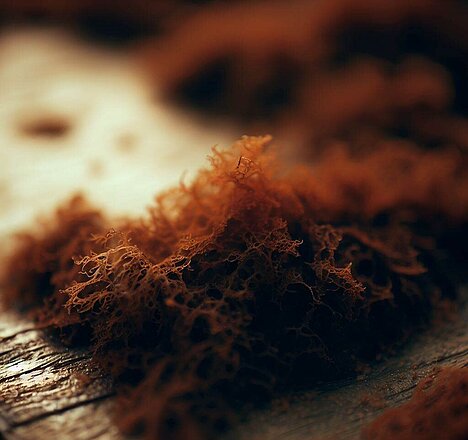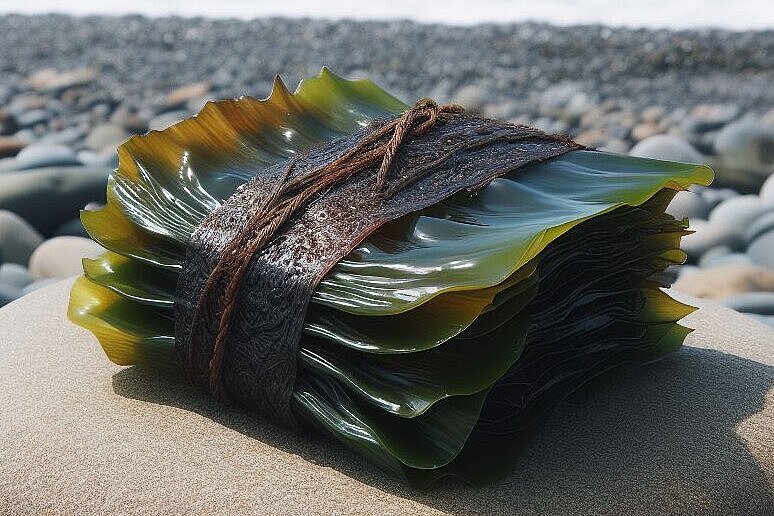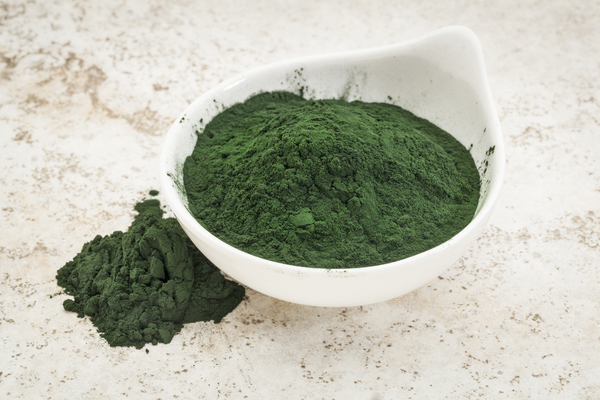Brown algae

What are brown algae?
Brown algae are algae that do not belong to the plant family but to the protist family. They live in seawater and can look very different depending on the species. Some are small and filamentous, others form large leaves or stalks. Well-known examples of brown algae are kelp, wakame, fucus and spirulina.
Brown algae contain many valuable ingredients that are important for human and animal health. These include
- Iodine: Iodine is an essential trace element that is necessary for the function of the thyroid gland. Iodine deficiency can lead to symptoms such as tiredness, weight gain or hair loss. Brown algae are a natural source of iodine and can therefore prevent or compensate for iodine deficiency.
- Iron: Iron is a mineral that is responsible for the formation of red blood cells and the transportation of oxygen in the blood. An iron deficiency can lead to anemia, weakness or paleness. Brown algae contain a lot of iron and can therefore prevent or compensate for an iron deficiency.
- Calcium: Calcium is a mineral that is important for the stability of bones and teeth as well as for the function of muscles and nerves. A calcium deficiency can lead to osteoporosis, dental problems or muscle cramps. Brown algae contain a lot of calcium and can therefore prevent or compensate for a calcium deficiency.
- Magnesium: Magnesium is a mineral that is important for the relaxation of muscles and nerves as well as for energy production in the cells. A magnesium deficiency can lead to muscle tension, headaches or tiredness. Brown algae contain a lot of magnesium and can therefore prevent or compensate for a magnesium deficiency.
- Zinc: Zinc is a trace element that is important for the functioning of the immune system, wound healing and metabolism. A zinc deficiency can lead to susceptibility to infections, skin problems or loss of appetite. Brown algae contain a lot of zinc and can therefore prevent or compensate for a zinc deficiency.
- Vitamin A: Vitamin A is a fat-soluble vitamin that is important for eyesight, skin health and growth. A lack of vitamin A can lead to night blindness, dry skin or growth disorders. Brown algae contain a lot of vitamin A and can therefore prevent or compensate for a vitamin A deficiency.
- Vitamin B: Vitamin B is a group of water-soluble vitamins that are important for the functioning of the nervous system, blood formation and energy metabolism. A vitamin B deficiency can lead to nervousness, tiredness or anaemia. Brown algae contain many different B vitamins and can therefore prevent or compensate for a vitamin B deficiency.
- Vitamin C: Vitamin C is a water-soluble vitamin that is important for the functioning of the immune system, collagen formation and protection against free radicals. A vitamin C deficiency can lead to scurvy, susceptibility to infections or bleeding gums.
What are the disadvantages of brown algae for dogs?
Brown algae are not suitable for every dog. They can also have some disadvantages that you should consider before feeding them to your dog.
- One of the disadvantages of brown algae is that it can contain too much iodine. This can lead to hyperthyroidism, which can cause symptoms such as weight loss, nervousness, palpitations and diarrhea. If your dog is already taking thyroid medication, you should not feed them brown seaweed as this can lead to an overdose.
- Another disadvantage of brown algae is that they can absorb heavy metals or other harmful substances from seawater. This can lead to poisoning or long-term organ damage. This is why you should only buy brown algae from trustworthy sources that have been tested for purity.
- A third disadvantage of brown algae is that they can trigger allergies or intolerances. Some dogs are sensitive to brown algae and show symptoms such as vomiting, diarrhea or skin rashes. Therefore, you should always be careful when giving your dog a new food or a new ingredient and observe your dog's reaction.
Brown algae is a nutritious ingredient in dog food that can have some health benefits. They can improve thyroid function, skin and coat health as well as a dog's digestion. However, they are not suitable for all dogs and can also have some disadvantages. They can contain too much iodine, heavy metals or other harmful substances or cause allergies and intolerances.
Properties 23
Are you looking for other ingredients with a specific property?
Just click on them to find more.
If you notice any signs of hypersensitivity or poisoning in your dog, you should see your vet immediately. We are not a substitute for a vet, but we try to be as accurate as possible. Every dog reacts differently and we recommend you get a second opinion or consult your vet if in doubt.
Stay healthy and take good care of your four-legged friend!😊
Similar to Brown algae
Nori is a seaweed that grows in shallow waters. It is harvested, washed, pressed into thin sheets and dried. Nori has a dark green color and a mild taste. It is rich in protein, fiber, minerals and...
Wakame (Undaria pinnatifida) is a marine brown algae species that was originally native to the coasts of East Asia. However, due to its invasive nature, it has now spread to many other seas. Wakame...
Kombu is a brown algae that belongs to the genus Laminaria. It grows in cold seas and forms long, leathery leaves with finger-like appendages. Kombu is mainly cultivated and harvested in Japan,...
Spirulina is a blue-green algae that is one of the oldest living organisms on earth. It is found in salty lakes and waters and can feed itself through photosynthesis. Spirulina has a spiral...



